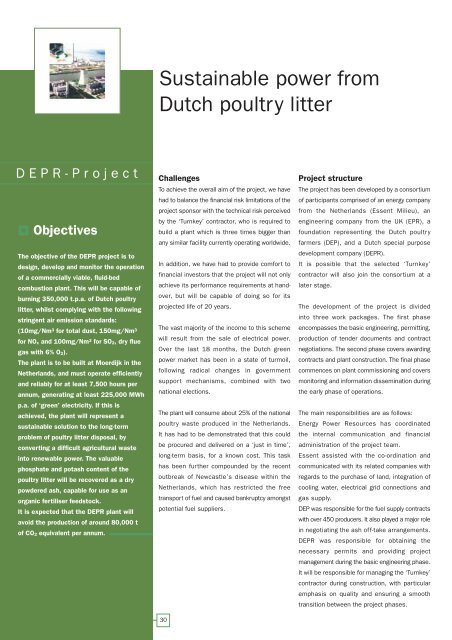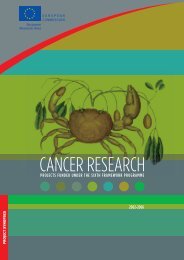European Bio-Energy Projects
European Bio-Energy Projects
European Bio-Energy Projects
Create successful ePaper yourself
Turn your PDF publications into a flip-book with our unique Google optimized e-Paper software.
DEPR-Project Challenges<br />
Objectives<br />
The objective of the DEPR project is to<br />
design, develop and monitor the operation<br />
of a commercially viable, fluid-bed<br />
combustion plant. This will be capable of<br />
burning 350,000 t.p.a. of Dutch poultry<br />
litter, whilst complying with the following<br />
stringent air emission standards:<br />
(10mg/Nm3 for total dust, 150mg/Nm3 for NOx and 100mg/Nm3 for SO2, dry flue<br />
gas with 6% O2).<br />
The plant is to be built at Moerdijk in the<br />
Netherlands, and must operate efficiently<br />
and reliably for at least 7,500 hours per<br />
annum, generating at least 225,000 MWh<br />
p.a. of ‘green’ electricity. If this is<br />
achieved, the plant will represent a<br />
sustainable solution to the long-term<br />
problem of poultry litter disposal, by<br />
converting a difficult agricultural waste<br />
into renewable power. The valuable<br />
phosphate and potash content of the<br />
poultry litter will be recovered as a dry<br />
powdered ash, capable for use as an<br />
organic fertiliser feedstock.<br />
It is expected that the DEPR plant will<br />
avoid the production of around 80,000 t<br />
of CO2 equivalent per annum.<br />
Sustainable power from<br />
Dutch poultry litter<br />
To achieve the overall aim of the project, we have<br />
had to balance the financial risk limitations of the<br />
project sponsor with the technical risk perceived<br />
by the ‘Turnkey’ contractor, who is required to<br />
build a plant which is three times bigger than<br />
any similar facility currently operating worldwide.<br />
In addition, we have had to provide comfort to<br />
financial investors that the project will not only<br />
achieve its performance requirements at handover,<br />
but will be capable of doing so for its<br />
projected life of 20 years.<br />
The vast majority of the income to this scheme<br />
will result from the sale of electrical power.<br />
Over the last 18 months, the Dutch green<br />
power market has been in a state of turmoil,<br />
following radical changes in government<br />
support mechanisms, combined with two<br />
national elections.<br />
The plant will consume about 25% of the national<br />
poultry waste produced in the Netherlands.<br />
It has had to be demonstrated that this could<br />
be procured and delivered on a ‘just in time’,<br />
long-term basis, for a known cost. This task<br />
has been further compounded by the recent<br />
outbreak of Newcastle’s disease within the<br />
Netherlands, which has restricted the free<br />
transport of fuel and caused bankruptcy amongst<br />
potential fuel suppliers.<br />
30<br />
Project structure<br />
The project has been developed by a consortium<br />
of participants comprised of an energy company<br />
from the Netherlands (Essent Milieu), an<br />
engineering company from the UK (EPR), a<br />
foundation representing the Dutch poultry<br />
farmers (DEP), and a Dutch special purpose<br />
development company (DEPR).<br />
It is possible that the selected ‘Turnkey’<br />
contractor will also join the consortium at a<br />
later stage.<br />
The development of the project is divided<br />
into three work packages. The first phase<br />
encompasses the basic engineering, permitting,<br />
production of tender documents and contract<br />
negotiations. The second phase covers awarding<br />
contracts and plant construction. The final phase<br />
commences on plant commissioning and covers<br />
monitoring and information dissemination during<br />
the early phase of operations.<br />
The main responsibilities are as follows:<br />
<strong>Energy</strong> Power Resources has coordinated<br />
the internal communication and financial<br />
administration of the project team.<br />
Essent assisted with the co-ordination and<br />
communicated with its related companies with<br />
regards to the purchase of land, integration of<br />
cooling water, electrical grid connections and<br />
gas supply.<br />
DEP was responsible for the fuel supply contracts<br />
with over 450 producers. It also played a major role<br />
in negotiating the ash off-take arrangements.<br />
DEPR was responsible for obtaining the<br />
necessary permits and providing project<br />
management during the basic engineering phase.<br />
It will be responsible for managing the ‘Turnkey’<br />
contractor during construction, with particular<br />
emphasis on quality and ensuring a smooth<br />
transition between the project phases.

















